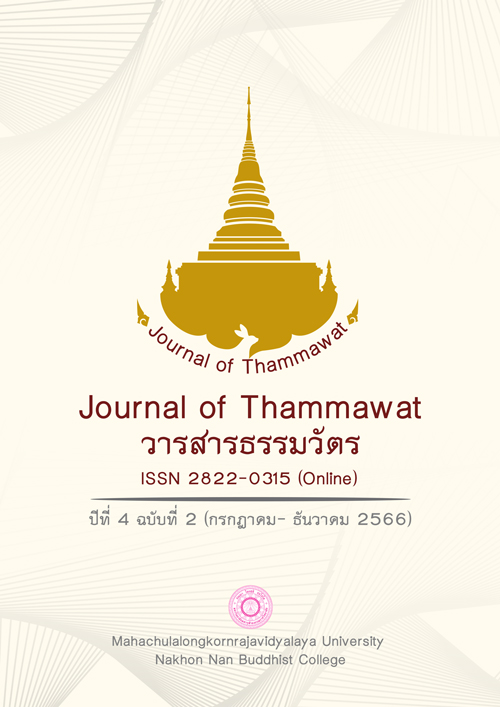Buddhist Principles in Business Promoting of the Nan Municipality Women’s Truth Saving Fund, Nan Province
Main Article Content
Abstract
The purpose of this article were: 1) to study the history of Nan municipality women’s truth saving fund, Nan province, 2) to study the management model of Nan municipality women’s truth saving fund, Nan Province, and 3) to study Buddhist principles for enhancing the procedure of Nan municipality women’s truth saving fund, Nan Province. This was a qualitative research with members of women’s truth saving fund providing important information using a purposive selection method.
The result of the research found that Nan municipality women’s truth saving fund, Nan province has established in 2546 B.E. It was a grouping of women in the Nan municipality area. This fund had established to solve the lack of fund problem; giving women in Nan municipality bring the funds to use with effort, honesty, thrifty, and validity. The management models of Nan municipality women’s truth saving fund had two models, the original model depends on honesty and trust in the saving truth working group and the new model depends on a new management system that had 7 topics, there were planning, organizing, staffing, directing, Co-coordinating, reporting, and budgeting. Buddhist principles used for managing Nan municipality women’s truth saving fund are Brahmavihara 4, Iddhippada 4, Garavasadhamma 4, and Kalyanamittadhamma 7. Buddhist principles above could apply to develop and bring more morals in the working process, causing administrators and members have working with morals and more believable by making honesty in the working process bringing the development of fund increased, this could bring benefit from interest and dividend from the fund to create benefits for their own and community for sustainable development.
Article Details

This work is licensed under a Creative Commons Attribution-NonCommercial-NoDerivatives 4.0 International License.
References
ธณจรัส พูนสิทธ์. (2541). การจัดการองค์การและการบริหาร. กรุงเทพมหานคร: สหธรรมิก.
ธยายุส ขอเจริญ. (2563). การบริหารจัดการกลุ่มสัจจะสะสมทรัพย์โดยการมีส่วนร่วมของชุมชนอย่างยั่งยืน.
วารสารสหวิทยาการมนุษยศาสตร์และสังคมศาสตร์, 6(1), 40-57.
พระธรรมโกศาจารย์ (ประยูร ธมมจิตโต). (2549). พุทธวิธีการบริหาร. พิมพ์ครั้งที่ 4. กรุงเทพมหานคร:
โรงพิมพ์มหาจุฬาลงกรณราชวิทยาลัย.
พุฒิพัฒก์ ศรีไตรรัตน์. (2548). การบริหารจัดการกลุ่มสัจจะสะสมทรัพย์เพื่อพัฒนาคุณธรรมครบวงจรชีวิต สำนักสงฆ์ทุ่งคาวนารามบ้านลานวัว ตำบลกะหรอ กิ่งอำเภอนบพิตำ จังหวัดนครศรีธรรมราช. วารสารสันติศึกษาปริทรรศน์ มจร, 3(2), 98-114.
พระมหาวุฒิชัย วชิรเมธี (ว. วชิรเมธี). (2550). คนสำราญงานสำเร็จ. พิมพ์ครั้งที่ 3. กรุงเทพมหานคร: บริษัท อัมรินทร์พริ้นติ้งแอนด์พลับลิชชิ่ง จำกัด (มหาชน).
พยอม วงศ์สารศรี. (2542). องค์การและจัดการ. กรุงเทพมหานคร: พรานนกการพิมพ์.
มหาจุฬาลงกรณราชวิทยาลัย. (2539). พระไตรปิฎกภาษาไทย ฉบับมหาจุฬาลงกรณราชวิทยาลัย. กรุงเทพมหานคร: โรงพิมพ์มหาจุฬาลงกรณราชวิทยาลัย.
สมคิด บางโม. (2558). องค์การและการจัดการ. กรุงเทพมหานคร: บริษัท วิทยพัฒน์ จำกัด.
สนธยา พลศรี. (2550). เครือข่ายการเรียนรู้ในงานพัฒนาชุมชน. พิมพ์ครั้งที่ 2. กรุงเทพมหานคร: โอเดียนสโตร์.
อนันต์ แม้นพยัคฆ์. (2549). การประยุกต์ใช้หลักพุทธธรรมเพื่อเสริมสร้างความเข้มแข็งของชุมชนด้วยกลุ่มสัจจะสะสมทรัพย์ เพื่อพัฒนาคุณธรรมครบวงจรชีวิตกรณีศึกษา บ้านหนองน้ำจืด ตำบลท่าพริกอำเภอเมือง จังหวัดตราด (วิทยานิพนธ์พัฒนาชุมชนมหาบัณฑิต). มหาวิทยาลัย ธรรมศาสตร์.


